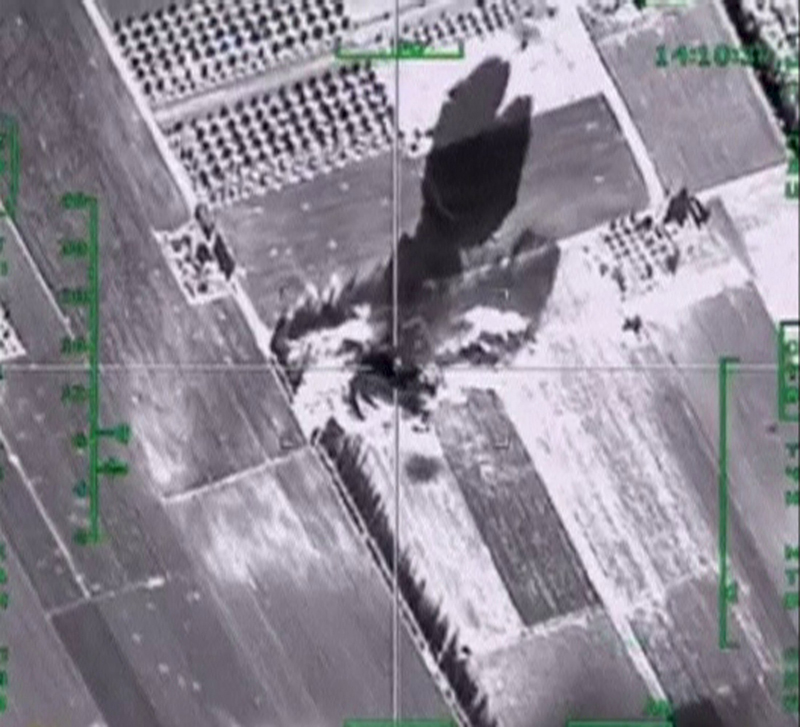Syrian rebel group appoints successor to slain commander
BEIRUT: Militant groups in Syria on Saturday mourned the death of a powerful rebel commander killed the previous day in an airstrike near Damascus — a high-profile assassination that may shift the balance of power in rebel-held suburbs of the country's capital.
Zahran Allouch, the head of the Army of Islam group, was killed in an airstrike that targeted the group's headquarters during a meeting on Friday. He was instantly killed along with a number of commanders from the ultraconservative Ahrar al-Sham and the Faylaq al-Rahman groups.
His death may also have contributed — at least partially — to a delay in the agreed-on pullout of thousands of militants and their families from neighborhoods on the southern edge of Damascus.
The pullout, which was supposed to start on Saturday, was to involve mainly militants from the Islamic State group who earlier this year overran the Yarmouk area, which is home to a Palestinian refugee camp and has been hotly contested and fought-over in the Syrian conflict, and two adjacent neighborhoods.
A Palestinian official in Damascus, Anwar Abdulhadi, told The Associated Press that the withdrawal is being delayed for "logistical reasons." But Lebanon's Hezbollah-run TV station Al Manar said that Allouch was a key figure in arranging the rare deal, and that his assassination has delayed its implementation. The report could not be immediately confirmed by the AP.
Allouch's killing — a month before peace talks are scheduled to begin between the Syrian government and opposition rebel groups — is a blow to insurgents fighting to topple President Bashar Assad and a boost to government forces who have been bolstered by the Russian military intervention in Syria in the past few months.
Syrian government forces have been on the offensive in several parts of the country since Russia began its military campaign in late September to shore up Assad's forces.
The Army of Islam took part earlier this month in an opposition meeting held in Saudi Arabia to agree on an opposition delegation that would negotiate with Assad's government representatives in peace talks planned for late January in Geneva. The Syrian government describes the group as "terrorists" and has said it will not negotiate with such factions.
The Syrian army claimed responsibility for the airstrike that killed Allouch, although many among the opposition blamed Russia.
"The martyrdom of Sheikh Zahran Allouch should be a turning point in the history of the revolution and rebel groups should realize they are facing a war of extermination by (Russian President Vladimir) Putin's regime," said Labib Nahhas, a senior member of the Ahrar al-Sham group.
"The next stage will witness the liquidation of those leaders who began the uprising," wrote Abu Hassan al-Muhajer, another senior member of the group on Twitter.
Other insurgent groups, including the al-Qaida branch in Syria, the Nusra Front, lamented his killing.
The Army of Islam group swiftly appointed Essam al-Buwaydhani, a field commander known as Abu Hammam, as the new leader of the group, replacing Allouch.
In a video posted on the Internet late Thursday, a spokesman for the Army of Islam said Allouch's killing "will only increase our fight" against Assad's government and the Islamic State group.
"We are moving forth on the path, and we do not change or alter," the unidentified speaker said, reading from a statement.
In a statement, the Nusra Front said Allouch died after years of "sacrifice" and wished his successor luck.
Allouch, who was in his mid-40s, was widely known to be supported by Saudi Arabia and Turkey. He was one of the most powerful rebel commanders with thousands of fighters controlling large parts of the eastern Damascus suburbs of Eastern Ghouta and Douma. In addition to fighting government forces, the Army of Islam faction fought pitched battles against its rival, the Islamic State group near Damascus.
A former prisoner who was released in a general amnesty after the uprising against Assad began in March 2011, Allouch joined the armed opposition and formed the Army of Islam — which soon became one of the most organised rebel factions in Syria.
Critics accused him of sectarian politics and brutal tactics similar to that of the Islamic State group.
He is blamed by other opposition groups for the December 2013 disappearance of four prominent activists, including human rights activist and lawyer Razan Zaytouni. He has denied holding them, although they were abducted from an area under Army of Islam control.
Earlier this year, after government airstrikes on the suburbs of Damascus killed dozens, Allouch's fighters forced some Alawites whom his group was holding into cages that were then displayed in public areas and markets, using them as human shields to try to prevent further airstrikes. Alawites are a Shiite offshoot to which Assad's family also belongs.
The large metal cages with men and women inside were then put on pick-up trucks that drove around Damascus suburbs.






